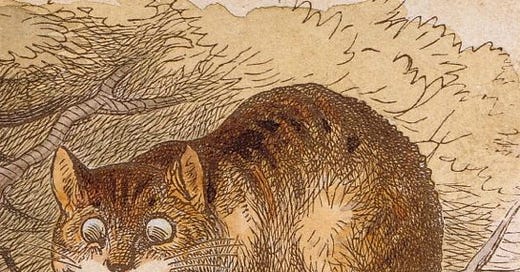Toronto, May 25, 2025
The Cheshire Cat
“All right,” said the Cat; and this time it vanished quite slowly, beginning with the end of the tail, and ending with the grin, which remained some time after the rest of it had gone...” (from Alice’s Adventures in Wonderland, by Lewis Carroll)
We vanish as we age. Once you may have been a contender. People recognized your name. They cared about your opinion, sought your approval, required your consent. They anticipated your next corporate manoeuvre, blockbuster novel, newspaper op-ed, run for elected office. But things have changed. Now you are in the world of “what ever happened to what’s-his-name?”
Is that okay with you? Perhaps you are relieved that you no longer need to strive, that at last you can relax. Or do you, afraid of irrelevance and obscurity, try to hang on? Do you, consumed by late-onset ambition, continue to compete?
Some old people vanish gracefully. Others fight tooth and nail to stay visible. They embrace the exhortation: “Rage, rage against the dying of the light” (from the famous 1947 Dylan Thomas poem Do not go gentle into that good night). When they lose the fight (this is inevitable), they leave behind, not a smile, but resentment and disappointment, even despair.
Those who rage know that there will likely be few triumphs in their future, and so they cling instead to past glory. King Lear divided his kingdom among his daughters, intending to "unburdened crawl toward death." But although unburdened, he wanted to retain the status and respect due a king: “Only we shall retain / The name and all th’ additions to a king.” (Shakespeare, King Lear, Act 1, Scene 1) The consequences for Lear of trying to cling to glory unburdened were not good: "You see me here, you gods, a poor old man, /As full of grief as age; wretched in both. (Act 2, Scene 4)
Which brings me to Joe Biden. He did not want to crawl toward death unburdened. He wanted to retain the burdens of the presidency (and its power and status) and in 2024, aged 80, announced he was running for re-election. But, as a new book—Original Sin, by Jake Tapper and Alex Thompson— makes clear, by then Biden was physically and mentally compromised. The New York Times describes the Tapper/Thompson book as “a damning, step-by-step account of how the people closest to a stubborn, aging president enabled his quixotic resolve to run for a second term.” Biden’s decision to run for re-election, and subsequent withdrawal from the race, was a disaster for the United States (it led to the election of Donald Trump) and the Democratic Party (left rudderless). One must believe that his decision to run, encouraged by aides and family members with their own agendas, was in part motivated by his muddled vanity and hubris.
Those who are aging but are not kings or presidents must resort to less dramatic ways of trying to cling to relevance and reputation. They loudly exaggerate past achievements, for example, or write memoirs, or start Substacks, or create elaborate self-congratulatory websites, or make controversial statements hoping to attract attention, or give money to charities in exchange for naming rights (a sports field, perhaps, or a bank of elevators in a hospital.) But, in the long term, none of this works. “The paths of glory lead but to the grave.” (Thomas Gray, Elegy Written in a Country Churchyard)
Better to be the Cheshire Cat. If you must leave something behind, leave a smile.
******
Some reader comments on Newsletter #106 (“The Leopard”)
From Peter Mushkat, a Nova Scotia friend: “The Leopard has been on my favourites list ever since I first read it roughly 50 years ago. Also love the Visconti film although flawed. Interesting to consider if he had been able to follow through with his original casting choice of Olivier for Don Fabrizio (the producers felt that Lancaster would do better at the Box Office) especially as Olivier was outstanding as Lord Marchmain in Brideshead.”
From Danielle Vachon: “Wanna watch that movie.”
From Kathleen: “This is a reminder that change is always occurring. Some change is desired - some, not so much. I must add The Leopard to my reading list. I am a fan of Peter Senge's book The Dance of Change.”
From Karin Turkington: “‘Exogenousity’ - having never encountered this word before, I like the look and sound of it. Will I ever have the opportunity to use it or even remember it? I don't know.”
And we hear again from my severest critic: “This outreach of The Leopard is truly mind boggling, beyond your usual intimidating range of erudition. “We dance with exogenousity.” Who is dancing? I could never dance even after a Miss Van Valkenburg gave me a lesson or two. I should start now? My guess is your dancing is slow shuffle. I read The Leopard 50 years ago.”







Age is about loss. To combat that we have the regenerative strength of memory. It washes over us like a powerful surf, sweeping us into a vivid & vital past. And sadly, it also brings an undertow, threatening to pull us from what was to what is. Don’t give “what is” any hold. “What was” is always there, not as an escape but as a reminder of happy & tragic events, failures & successes, love & lovers, the underscoring of family. Retreating into memory is a kind of time travel, where you immerse yourself in all the happenings & people that made you what you became, what you are. Memories. Celebrate them, cash in on them. They are a sustaining mindfulness that make a day worthwhile.
Fairly early on in my tenure at The Globe, I realized that most of the acquaintances and respectful relationships I made would not long (if at all) survive my retirement, that many were owing to position, not person. I have always been fine with that. It is the way of the world, and I count myself lucky to have had a good run at all.